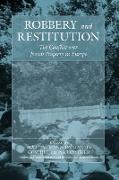- Start
- Robbery and Restitution
Robbery and Restitution
Angebote / Angebote:
A well-structured, ambitious collection of essays, it will certainly be an essential read for anyone interested in the anti-Jewish policies of National Socialist Germany and their long-term consequences for postwar Europe." · H-German The robbery and restitution of Jewish property are two inextricably linked social processes. It is not possible to understand the lawsuits and international agreements on the restoration of Jewish property of the late 1990s without examining what was robbed and by whom. In this volume distinguished historians first outline the mechanisms and scope of the European-wide program of plunder, before assessing the effectiveness and historical implications of post-war restitution efforts. Integrating the abundance of new research on the material effects of the Holocaust and its aftermath, a comparative perspective is offered on both robbery and restitution, examining developments in countries such as Germany, Poland, Italy, France, Belgium, Hungary and the Czech Republic. The international and interrelated nature of property confiscation initiated by Nazi Germany and its satellite states offers new insights into the functions and beneficiaries of state sanctioned robbery. Although the extent of implementation varied, Jewish spoils were used to boost support for anti-Jewish policies and prop up ailing war finances throughout Europe. Thus the combination of personal enrichment and state plunder were two sides of the same coin. The prolonged struggles over restitution issues are confronted in the second section of the book on the basis of eight national studies. Everywhere the solution of legal and material problems was intertwined with changing national myths about the war and conflicting interpretations of justice. Even those countries that pursued extensive restitution programs using rigorous legal means were unable to compensate or comprehend fully the scale of Jewish loss. Especially in Eastern Europe, it was not until the collapse of communism that even the concept of restoring some Jewish property rights became a viable option. The legacy of robbery and restitution offers both a model for redefining the practice of human rights and keys to understanding the lingering ghosts of antisemitism in countries where few Jews remain. Martin Dean is a Research Scholar at the Center for Advanced Holocaust Studies, United States Holocaust Memorial Museum (USHMM). He is the author of Collaboration in the Holocaust, published in association with the USHMM in 2000, and of several articles on the confiscation of Jewish property. From 1992 to 1997 he worked as Senior Historian for the Metropolitan Police War Crimes Unit. Constantin Goschler teaches modern history at the Humboldt-University, Berlin. He also taught at the universities of Prague, Jena and Bochum. His main fields of interest are transitional justice in the 20th century, history of science and the history of political ideas in the 19th century. He published several articles and books on restitution and indemnification for Nazi victims. Philipp Ther teaches modern Central and Eastern European History at the European University Frankfurt/Oder, Germany. His fields of interest are comparative nationalism studies, migrations and "ethnic cleansing", postwar social history of Central Europe and most recently the history of opera theatres in the long 19th century.
Lieferbar in ca. 10-20 Arbeitstagen
